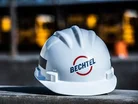Bechtel Launches Carbon-Free Nuclear Power Plant

Nuclear power has been a challenging source of energy to make 100% sustainable throughout history, but Bechtel has leaped forward, with the launch of a new nuclear plant designed for clean and sustainable power generation.
One of the biggest hurdles nuclear power has faced throughout time, is radioactive waste management and its safe disposal; as nuclear waste remains hazardous in soil, water and air for thousands of years, proven from nuclear accidents like Chernobyl in 1986 and Fukushima in 2011.
But major technology and safety developments have progressed in recent years, and now, globally, nuclear power plants produce more than one quarter of all low carbon electricity.
Several major companies around the world currently utilise nuclear power, including: Électricité de France (EDF) (France), Exelon Corporation (US), and Tokyo Electric Power Company (TEPCO) (Japan).
- Ageing reactors
- High maintenance costs
- Public safety concerns
- Immense clean up and decommissioning costs
- Need to transition to alternative energy sources
- Need for extensive safety measures
- Managing radioactive waste
- Meeting the growing energy demand in an environmentally sustainable manner
Yet Bechtel has acted as engineering, procurement, and construction partner to TerraPower (the nuclear innovation company) and GE Hitachi technology, to produce the ground-breaking Natrium Demonstration Project - the advanced nuclear reactor that will deliver carbon-free power.
How is the Natrium Demonstration Project carbon free?
The project is based in Kemmerer, Wyoming, and is part of the U.S. Department of Energy's Advanced Reactor Demonstration Program, and has utilised advanced technology to eradicate CO2 emissions, including:
1. Nuclear fission
Through nuclear fission, the plant will generate electricity which does not produce greenhouse gas emissions, and so this nuclear power is a carbon-free electricity source.
2. Fast reactor design
The project uses a sodium-cooled fast reactor design, which can produce more fuel than it consumes by converting fertile uranium into fissile plutonium through neutron capture, which will improve fuel efficiency.
3. Fuel recycling
Plans will recycle the used nuclear fuel through electrometallurgical reprocessing, which is a process that can recover the remaining material. This closes the fuel cycle and minimises nuclear waste compared to conventional reactors.
4. Integrated energy system
The plant design can produce hydrogen, steam, and high-temperature heat that could enable carbon-free production of synthetic fuels and other industrial processes.
5. Advanced safety features
There are new passive safety systems aimed at reducing risks compared to conventional nuclear plants.
So in essence, by using emission-free nuclear fission, a sustainable fuel cycle, reprocessing used fuel, and potential hydrogen and clean industrial heat production, the Natrium project will produce carbon-free nuclear energy technology.
How else is the project sustainable?
As well as the carbon-free electricity the plant will generate, by using liquid sodium coolant in advanced fast reactors, the reactor can enable the recycling of spent nuclear fuel and the extraction of additional energy from depleted uranium.
Additionally, the plant's modular design and advanced manufacturing techniques facilitate efficient construction and deployment, reducing capital costs and enabling scalability.
Then, in a chain reaction, this cost-effectiveness enhances the economic viability of the technology, promoting its widespread adoption and accelerating the transition towards a sustainable energy landscape.
What technology have Bechtel advanced to achieve this project?
One key advancement in the project is the implementation of a molten salt thermal energy storage system, which separates the reactor's heat generation from electricity production.
This feature allows for the storage of thermal energy during periods of low demand and its subsequent release for electricity generation during peak demand periods, enhancing grid flexibility and reliability.
Additionally, the project incorporates advanced safety features, such as passive cooling systems and inherent safety characteristics, minimising the risk of accidents and ensuring robust protection for the surrounding environment and communities.
Overall, this unique technology will provide a clean operation at 345 megawatts with the capability to reach as high as 500 megawatts, generating enough energy to power 400,000 homes and provide jobs in Wyoming for decades to come.
Reflecting on this milestone, Craig Albert, Bechtel President and COO, says that the project is designed to be “safer, cleaner, faster, and more efficient than many energy source alternatives."
******
Make sure you check out the latest news at Construction Digital, a BizClik brand.




